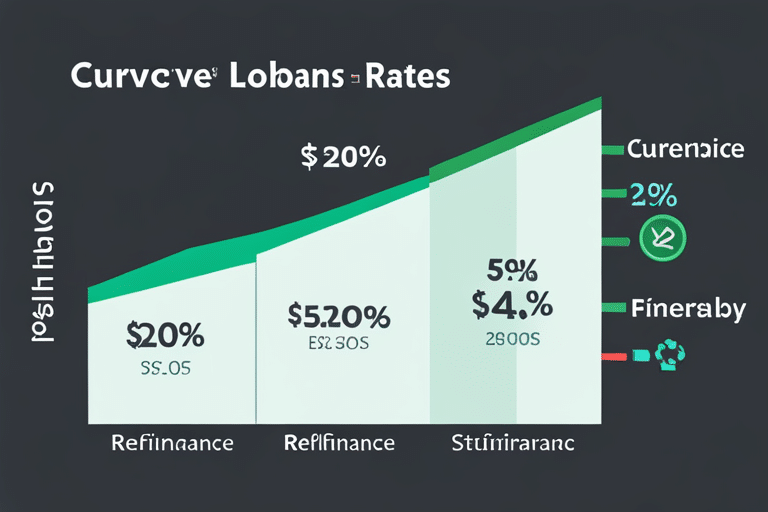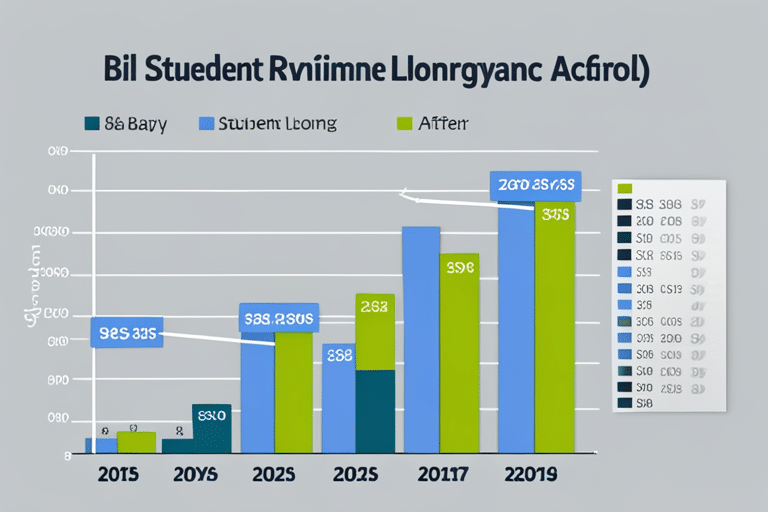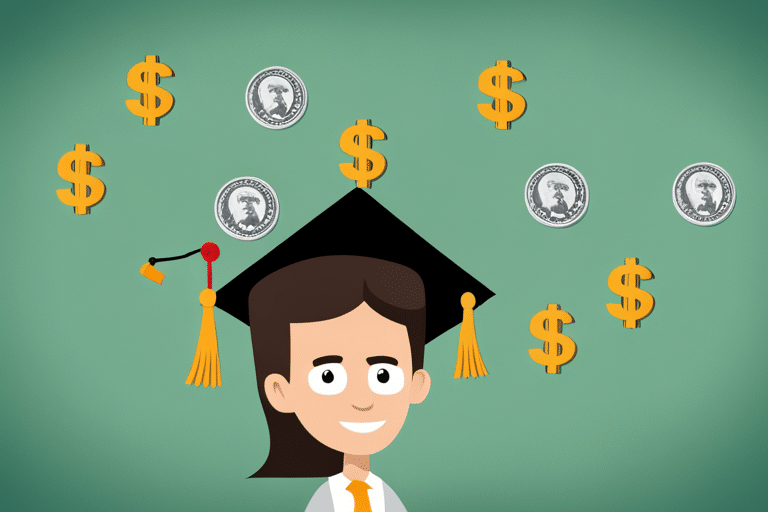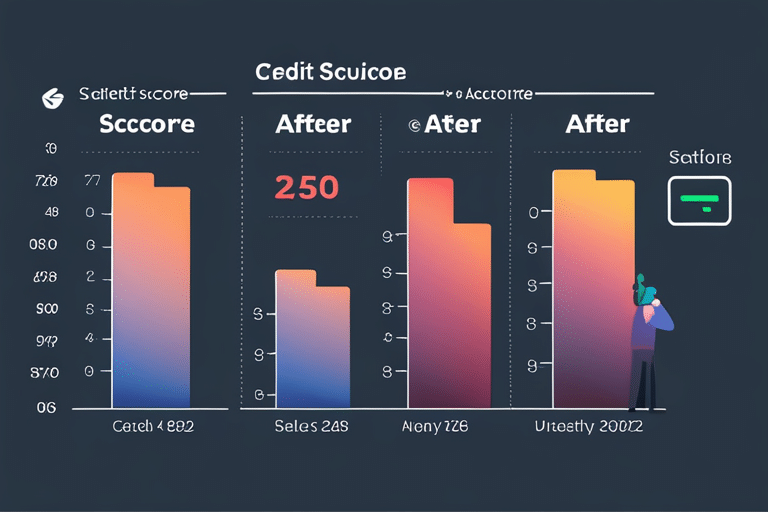Are you ready to revolutionize your student loan situation? Get ready for the remarkable impact of refinancing!
This article will explore the pros and cons of refinancing student loans, providing a comprehensive overview of its benefits and drawbacks.
Discover how this financial maneuver can lower interest rates, impact monthly payments, and even affect your credit score.
But beware – there are risks involved too.
So buckle up and prepare to navigate the world of student loan refinancing with finesse and mastery!
Key Takeaways
- Refinancing student loans can lead to lower interest rates and improved creditworthiness.
- Flexible repayment options allow borrowers to customize their loan payments.
- Refinancing offers the opportunity to achieve long-term financial goals and potential savings.
- However, there are drawbacks to consider, such as the potential loss of federal loan benefits and the possibility of extended repayment periods.
The Basics of Student Loan Refinancing

If you’re considering refinancing your student loans, it’s important to understand the basics of how it works. Don’t worry, my friend, I’m here to break it down for you in a way that won’t make your head spin.
Understanding the process is key when it comes to refinancing your student loans. It basically means taking out a new loan to pay off your existing ones. This can help you lower your interest rates or change the terms of your repayment plan. But before you jump into the deep end, make sure to compare lenders.
Comparing lenders is like trying on different shoes – you want to find the perfect fit for your financial situation. Look at things like interest rates, fees, and customer reviews. Think of yourself as a detective searching for clues about each lender’s reputation and reliability.
Understanding the Benefits of Refinancing

Hey, you ready to dive into the world of student loan refinancing? Well, buckle up because it’s about to get interesting.
We’re talking lower interest rates that will make your wallet do a happy dance.
Flexible repayment options that are as customizable as your favorite ice cream sundae.
And the potential for savings that could have you splurging on those fancy avocado toasts you’ve been eyeing.
Lower Interest Rates
Lower interest rates can save you significant money when refinancing your student loans.
Imagine this: You’re sitting in a room filled with stacks of cash, and each stack represents the amount of money you could be saving. That’s right, lower interest rates means more money in your pocket!
Not only will it make your monthly payments more manageable, but it will also have a positive impact on your creditworthiness. A better credit score opens doors to other financial opportunities, like getting approved for a mortgage or securing a low-interest car loan.
Plus, when you refinance at a lower rate, you’ll have extra cash to put towards your long term financial goals – whether that’s starting an emergency fund or investing in your dream business.
Flexible Repayment Options
Flexible repayment options allow you to tailor your loan payments to fit your specific financial situation. It’s like having a custom-made suit for your finances! With flexible repayment plans, you have the power to choose how much you want to pay each month.
Feeling a little tight on cash? No worries! You can defer your loan payments and take a breather until you’re back on your feet. Think of it as hitting the pause button on those pesky bills.
Life happens, and we get that. That’s why we offer these flexible options to help ease the burden of student loans. So go ahead, dance to the beat of your own wallet!
And speaking of wallets, did I mention there’s potential for savings? Let me tell you all about it…
Potential for Savings
There’s a chance to save money by taking advantage of potential discounts and offers. So, why not evaluate the risks and understand the process of refinancing your student loans? It may open up doors to significant savings! To give you a better understanding, here’s a handy table breaking down the pros and cons:
| Pros | Cons |
|---|---|
| Lower interest rates | Loss of federal loan benefits |
| Simplified repayment | Potential for higher monthly payments |
| Option for variable or fixed rates | Extended repayment period |
| Potential for better customer service | Requires credit check |
Now that you have evaluated both sides, it’s time to consider if refinancing is right for you. Take into account your financial goals, current interest rate, and long-term plans. Remember, understanding the process is key to making an informed decision on whether refinancing will truly benefit you in the long run. Happy saving!
Evaluating the Drawbacks of Refinancing

So, you’re thinking about refinancing your student loan, huh? Well, before you dive headfirst into the world of lower interest rates and monthly payments, let’s take a moment to consider the potential drawbacks.
Brace yourself for the possibility of higher interest rates and bid farewell to those sweet federal benefits that have been keeping you company all these years. But hey, no worries! We’ll guide you through this bumpy road with a sprinkle of creativity and a dash of lightheartedness.
Let’s get started!
Higher Interest Rates
Although refinancing student loans can help lower monthly payments, it’s important to consider the potential downside of higher interest rates.
Now, you might be thinking, ‘Higher interest rates? That sounds like a financial nightmare!’ Well, fear not my friend, for I am here to shed some light on this topic.
While it’s true that higher interest rates could mean paying more in the long run, there are also some financial implications that you should take into account.
For instance, if you plan on paying off your loan quickly or have a stable income that allows you to make larger monthly payments, the impact of those higher interest rates may not be as significant.
However, if you’re looking for a longer-term solution with lower monthly payments, it might be worth exploring other options before diving headfirst into refinancing.
Loss of Federal Benefits?
Are you aware of the potential loss of federal benefits when refinancing your student loans? It’s like giving up a piece of cake for a plate full of Brussels sprouts. Okay, maybe it’s not that bad, but losing out on federal loan forgiveness is no small matter. If you refinance your loans with a private lender, say goodbye to those sweet government perks.
And let me tell you, those perks can have a long term financial impact. Federal loan forgiveness programs can be a game-changer for many borrowers. They offer the promise of wiping away part or all of your remaining debt after a certain number of qualifying payments. But if you refinance and leave the federal system behind, poof! Those dreams of debt-free bliss disappear faster than Cinderella at midnight.
But fear not! There is light at the end of this tunnel. The good news is that while refinancing may mean sacrificing some federal benefits, it can also lead to lower interest rates and potentially save you thousands in the long run. So before making any decisions, weigh the pros and cons carefully – because sometimes taking a bite out of those Brussels sprouts isn’t so bad after all.
How Refinancing Can Lower Interest Rates

You can lower your interest rates through student loan refinancing. It’s like finding a hidden treasure chest full of savings! Here are four ways refinancing can help you achieve financial mastery:
-
Lowering monthly payments: Refinancing allows you to secure a new loan with better terms, resulting in reduced monthly payments. Imagine the extra cash you’ll have for avocado toast and unicorn frappuccinos!
-
Long-term financial benefits: By lowering your interest rates, you’ll save big bucks over the life of your loan. Just think of all the possibilities – early retirement, jet-setting around the world, or finally starting that llama farm you’ve always dreamed of.
-
Simplified repayment journey: Refinancing consolidates multiple loans into one, making it easier to manage your finances and keep track of payments. Say goodbye to those pesky post-it notes scattered all over your desk!
-
Improved credit score potential: Making timely payments on your refinanced loan can boost your credit score, opening doors to future opportunities like buying a house or adopting a pet dragon.
Exploring the Impact on Monthly Payments

So, you’ve learned about how refinancing can lower your interest rates and save you some serious dough. But what about the impact on your monthly payments? Let’s dive in and explore!
When it comes to examining affordability, comparing interest rates is key. Picture this: you’re sitting at a fancy dinner party with two potential suitors. One offers a high interest rate that will have you eating instant noodles for years to come. The other, however, has a low interest rate that will leave you sipping champagne and dining like royalty.
By refinancing your student loans, you have the power to choose the suitor with the lowest interest rate. This means smaller monthly payments that won’t break the bank. It’s like going from shopping at Gucci to hitting up the thrift store – but without sacrificing style or quality.
Considering the Effect on Loan Repayment Terms

When it comes to the effect on loan repayment terms, it’s important to consider how refinancing will impact the length of time you’ll be paying off your debt. Refinancing can offer great benefits, but it also comes with its own set of considerations. Here are four key factors to keep in mind:
-
Loan Repayment Options: When you refinance, you have the opportunity to choose a new repayment plan that better suits your financial goals and circumstances. This could mean opting for a shorter term to pay off your loan quicker or extending the term for lower monthly payments.
-
Refinancing Fees: It’s crucial to understand the fees associated with refinancing. While there may be upfront costs involved, such as origination fees or application fees, they can often be offset by long-term savings from a lower interest rate.
-
Overall Interest Paid: By refinancing at a lower interest rate, you can potentially save thousands of dollars over the life of your loan. However, if you choose to extend the term of your loan during refinancing, this could result in paying more interest over time.
-
Impact on Credit Score: While refinancing itself does not directly impact your credit score, applying for multiple loans within a short period can have an effect. It’s important to weigh this potential impact against the potential benefits of refinancing.
Remember that everyone’s situation is unique when considering whether or not to refinance their student loans. Take into account these factors and consult with a financial advisor who specializes in student loans before making any decisions about your own loan repayment terms.
Examining the Potential for Savings

If you’re considering refinancing your loan, it’s important to examine the potential for savings that could come with lower interest rates.
So, picture this: You’re sitting in a cozy cafe, sipping on your favorite latte, and crunching some numbers on your laptop. As you calculate the long term savings of refinancing, you can’t help but feel a surge of excitement. With those lower interest rates, you could potentially save thousands of dollars over the life of your loan. It’s like finding money hidden under your mattress!
However, it’s not all sunshine and rainbows. Let’s not forget about the potential disadvantages. Refinancing may extend your repayment term or come with additional fees.
But hey, if you plan wisely and understand the fine print, those long term savings will be worth every sip of that delicious latte!
Analyzing the Impact on Credit Score

Analyzing your credit score is crucial when considering whether to refinance, as it can determine the interest rate you qualify for and the overall cost of your loan. Here are four things to keep in mind about the impact on your credit history and long-term financial implications:
-
Credit Check: When you apply for refinancing, lenders will check your credit score. This inquiry may slightly lower your score temporarily, but it’s necessary to assess your creditworthiness.
-
Payment History: Consistently making on-time payments after refinancing can positively impact your credit history. It shows responsible financial behavior and improves your creditworthiness.
-
Debt-to-Income Ratio: Refinancing allows you to potentially lower monthly payments, which lowers your debt-to-income ratio. A lower ratio indicates better financial stability and can boost your credit score.
-
Length of Credit History: Refinancing could lead to a new loan with a different term length. Be mindful that closing old accounts or opening new ones may affect the average age of your accounts and potentially impact your credit score in the short term.
Understanding the Risks of Refinancing

Understanding the risks of refinancing is crucial before making any decisions about your student loans.
So, you’re thinking about refinancing, huh? Well, hold your horses! Let’s talk about the potential downsides first.
Sure, refinancing can lower your interest rate and monthly payments, but there’s a catch. By refinancing federal student loans with a private lender, you might lose out on important benefits like income-driven repayment plans or loan forgiveness options.
Plus, if you have less-than-stellar credit, you may end up with a higher interest rate after refinancing. And let’s not forget about fees! Some lenders charge origination fees when you refinance, which can eat into your overall savings.
Assessing the Eligibility Criteria for Refinancing

To determine if you meet the eligibility criteria for refinancing, take a look at your credit score. It’s like looking in the mirror to see if you’re ready for a makeover. Here are four things to consider:
-
Credit Score: Lenders want to see that you’ve been responsible with your credit. A good score (think 700 or above) will give you better chances of approval.
-
Income: Show them the money! Lenders want to know that you have a steady income and can afford the monthly payments.
-
Debt-to-Income Ratio: This is like trying on skinny jeans – lenders want to make sure they fit comfortably. Keep your debt low compared to your income.
-
Employment History: They’ll be checking out your work history, so put on your professional pants and show stability.
Exploring Alternatives to Refinancing Student Loans

Hey, you, drowning in student loan debt? Don’t worry, we’ve got some unconventional tricks up our sleeves to help you out.
Let’s talk about the benefits of loan consolidation – it’s like a superhero swooping in to save the day!
And how about income-driven repayment plans? They’re like a magic wand that can make your monthly payments more manageable.
Oh, and don’t forget about those loan forgiveness programs – they’re like winning the lottery without even buying a ticket.
Loan Consolidation Benefits
Consider how loan consolidation can simplify your repayment process by combining multiple student loans into a single monthly payment. It’s like having all your favorite flavors in one delicious ice cream sundae.
Here are four reasons why loan consolidation is the cherry on top of your financial journey:
-
Streamlined Payments: Say goodbye to juggling different due dates and amounts. With loan consolidation, you’ll have just one payment to make each month, making it easier to stay organized.
-
Potential for Lower Interest Rates: By consolidating your loans, you may be able to secure a lower interest rate, saving you money over time.
-
Extended Repayment Terms: Loan consolidation often offers longer repayment terms, giving you more flexibility and potentially reducing your monthly payment amount.
-
Simplified Budgeting: With only one monthly payment to consider, managing your budget becomes a piece of cake.
Income-Driven Repayment Plans
So, you’ve learned about the benefits of loan consolidation and how it can simplify your repayment process. But what if you’re struggling to make those monthly payments on your student loans? Don’t worry, my friend, because there are income-driven repayment options available to help ease that burden.
These plans take into account your income and family size to determine a manageable monthly payment. It’s like having a personal financial advisor who understands your situation and wants to see you succeed! Plus, with these income-driven plans, you may even be eligible for student loan forgiveness programs after a certain number of years.
Imagine the weight lifted off your shoulders when you no longer have to stress about those high monthly payments. With income-driven repayment options and potential loan forgiveness programs, the future is looking brighter already!
Loan Forgiveness Programs
With loan forgiveness programs, you could potentially have a portion or even all of your student loans forgiven after a certain number of years. It’s like winning the lottery, but without the need for lucky numbers!
Here are 4 delightful alternatives to traditional loan forgiveness programs that can make your debt disappear faster than Houdini:
-
The Magic Wand Program: Wave that wand and poof! Your student loans vanish into thin air. No strings attached!
-
The Fairy Godmother Plan: A sprinkle of fairy dust and presto! Your loans turn into pumpkins (or perhaps something more valuable).
-
The Genie Grant: Rub that lamp and watch as the genie grants your wish for debt-free living. Abracadabra!
-
The Unicorn Fund: Seek out the mystical unicorn, who will grant you one wish – freedom from student loans.
But remember, while these alternative loan forgiveness options may seem enchanting, be mindful of their impact on your credit history. Choose wisely, my friend!
Frequently Asked Questions
What Are the Potential Tax Implications of Refinancing Student Loans?
Refinancing your student loans could have potential tax implications. It’s important to consider the financial consequences before making a decision. Don’t let taxes surprise you, be informed and take control of your finances!
Can Refinancing Student Loans Affect Eligibility for Loan Forgiveness Programs?
Can refinancing student loans affect your eligibility for loan forgiveness programs? It’s a tough question, but the impact on these programs can vary. Plus, don’t forget about the potential impact on your credit score!
How Does Refinancing Affect the Ability to Defer or Forbear Loan Payments?
When you refinance your student loans, the ability to defer or forbear loan payments may be affected. It’s important to understand how the refinancing process can impact your deferment options before making any decisions.
Are There Any Fees or Costs Associated With Refinancing Student Loans?
When refinancing student loans, you might be wondering about fees or costs. Well, let me put your mind at ease. While there may be some fees involved, the benefits of refinancing far outweigh them.
Can Refinancing Student Loans Affect the Borrower’s Ability to Transfer the Loan to Another Person Through Cosigner Release or Loan Assumption?
When you refinance your student loans, it’s important to consider the potential impact on cosigner release and loan assumption. You might face limitations or restrictions that could affect your ability to transfer the loan to someone else.
Conclusion
Congratulations, you’ve made it to the end of this wild ride through the world of student loan refinancing! So, what’s the verdict? Should you take the plunge and refinance your loans?
Well, my friend, that’s a decision only you can make. But before you do, ask yourself this: Can you picture a life with lower interest rates and more manageable monthly payments?
If so, then maybe it’s time to grab those reins and take control of your financial future. Remember, sometimes taking a leap of faith can lead to big rewards.
Happy refinancing!

